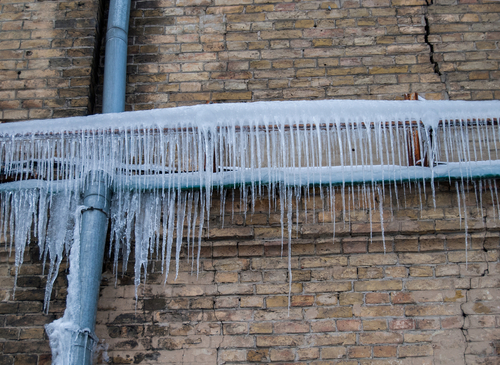Key Approaches for Preventing Frozen Pipes in Winter
Key Approaches for Preventing Frozen Pipes in Winter
Blog Article
Listed here down the page you can locate a bunch of quality insights concerning Helpful Tips to Prevent Frozen Pipes this Winter.

Cold weather can ruin your pipes, specifically by freezing pipes. Right here's just how to stop it from taking place and what to do if it does.
Introduction
As temperatures drop, the danger of icy pipes rises, potentially resulting in pricey repairs and water damage. Understanding how to prevent icy pipelines is critical for home owners in chilly climates.
Prevention Tips
Shielding at risk pipes
Wrap pipelines in insulation sleeves or utilize heat tape to shield them from freezing temperatures. Focus on pipelines in unheated or exterior locations of the home.
Heating strategies
Keep indoor spaces adequately heated up, especially areas with pipes. Open cupboard doors to allow warm air to flow around pipes under sinks.
Exactly how to recognize frozen pipes
Try to find lowered water flow from faucets, uncommon smells or sounds from pipelines, and noticeable frost on subjected pipes.
Long-Term Solutions
Architectural modifications
Consider rerouting pipelines away from outside walls or unheated locations. Add added insulation to attics, cellars, and crawl spaces.
Upgrading insulation
Buy premium insulation for pipelines, attics, and wall surfaces. Proper insulation assists preserve regular temperature levels and minimizes the risk of icy pipes.
Safeguarding Exterior Pipes
Yard hoses and exterior taps
Disconnect and drain yard tubes before wintertime. Set up frost-proof spigots or cover outdoor taps with protected caps.
Understanding Icy Pipes
What creates pipes to ice up?
Pipes ice up when exposed to temperature levels listed below 32 ° F (0 ° C) for prolonged durations. As water inside the pipes freezes, it increases, putting pressure on the pipe wall surfaces and potentially triggering them to rupture.
Threats and damages
Frozen pipelines can bring about water disruptions, home damage, and expensive repairs. Burst pipelines can flooding homes and trigger comprehensive structural damages.
Indicators of Frozen Water Lines
Determining frozen pipelines early can avoid them from bursting.
What to Do If Your Pipelines Freeze
Immediate activities to take
If you think icy pipes, maintain faucets open up to alleviate stress as the ice melts. Utilize a hairdryer or towels soaked in hot water to thaw pipelines slowly.
Final thought
Preventing frozen pipelines calls for proactive procedures and fast reactions. By comprehending the reasons, signs, and preventive measures, house owners can secure their plumbing during winter.
Helpful Tips to Prevent Frozen Pipes this Winter
UNDERSTANDING THE BASICS: WHY PIPES FREEZE AND WHY IT’S A PROBLEM
Water freezing inside pipes is common during the winter months, but understanding why pipes freeze, and the potential problems it can cause is crucial in preventing such incidents. This section will delve into the basics of why pipes freeze and the associated problems that may arise.
THE SCIENCE BEHIND FROZEN PIPES
When water reaches freezing temperatures, it undergoes a physical transformation and solidifies into ice. This expansion of water as it freezes is the primary reason pipes can burst. As the water inside the pipe freezes, it expands, creating immense pressure on the walls. If the pressure becomes too great, the pipe can crack or rupture, leading to leaks and water damage.
FACTORS THAT CONTRIBUTE TO PIPE FREEZING
Low Temperatures: Extremely cold weather, especially below freezing, increases the risk of pipes freezing. Uninsulated or Poorly Insulated Pipes: Pipes located in unheated areas, such as basements, crawl spaces, or attics, are more prone to freezing. Insufficient insulation or lack of insulation altogether exacerbates the problem. Exterior Wall Exposure: Pipes running along exterior walls are susceptible to freezing as they encounter colder temperatures outside. Lack of Heating or Temperature Regulation: Inadequate heating or inconsistent temperature control in your home can contribute to frozen pipes. PROBLEMS CAUSED BY FROZEN PIPES
- Pipe Bursting: As mentioned earlier, the expansion of water as it freezes can cause pipes to burst, resulting in significant water damage.
- Water Damage: When pipes burst, it can lead to flooding and water damage to your property, including walls, ceilings, flooring, and personal belongings.
- Structural Damage: Prolonged exposure to water from burst pipes can compromise the structural integrity of your home, leading to costly repairs.
- Mold and Mildew Growth: Excess moisture from water damage can create a favorable environment for mold and mildew growth, posing health risks to occupants.
- Disrupted Water Supply: Frozen pipes can also result in a complete or partial loss of water supply until the issue is resolved.
WHY CERTAIN PIPES ARE MORE PRONE TO FREEZING
- Location: Pipes located in unheated or poorly insulated areas, such as basements, crawl spaces, attics, or exterior walls, are at higher risk of freezing.
- Exterior Pipes: Outdoor pipes, such as those used for irrigation or exposed plumbing, are particularly vulnerable to freezing as they are directly exposed to the elements.
- Supply Lines: Pipes that carry water from the main water supply into your home, including the main water line, are critical to protect as freezing in these lines can affect your entire plumbing system.
- Underground Pipes: Pipes buried underground, such as those connected to sprinkler systems or outdoor faucets, can be susceptible to freezing if not properly insulated.
https://busybusy.com/blog/helpful-tips-to-prevent-frozen-pipes-this-winter/

I'm certainly very intrigued by How to prepare your home plumbing for winter weather and I'm hoping you liked my article. Appreciated our piece of writing? Please share it. Let others locate it. We appreciate reading our article about Helpful Tips to Prevent Frozen Pipes this Winter.
At This Website Report this page